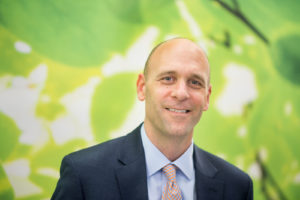
(Article courtesy the Sentinel & Enterprise) James Vander Hooven was expecting a lot of tough questions his first day this Monday as Mount Wachusett Community College president.
Is the tuition going to go up? Is there something you can do about the price of textbooks? What is your educational philosophy?
But one question caught him off-guard.
“I asked the students there if they had any questions for me and the very first student said ‘Well, how are you doing?’ ” he said. “And I’m like, ‘Whoa!’
“That was just so cool. That to me really provided a definition of the culture here.”
For some of the tougher questions, after one week on the job, he still doesn’t have answers , he said.
“I think it would be disingenuous of me to come in in my first week and say we’re going to have this specific program and we’re going to start it by the fall,” he said.
However, he is expecting to begin the process of creating a strategic plan to replace the three-year plan that ends in 2017. He said he wants the process, which will take about a year to develop, to involve the community, including businesses, industry, K-12 partnerships, as well as the college’s faculty, students and staff.
“We’re a community college,” he said. “The word community is really important there. We need to listening and engaging our partners agencies organizations, hospitals, et cetera to make sure that we are providing the academic programs that will meet there needs.”
Vander Hooven, 45, said he has been interested in the idea of educational access ever since he walked into a non-traditional classroom at a business school in Colorado prepared to teach “The Great Gatsby,” only to discover, at about age 28, he was the youngest person in the room.
“I don’t know if I ever taught ‘The Great Gatsby’ in my class,” he said. “I think they taught ‘The Great Gatsby’ to me.”
He was expecting to teach the book similar to the way he did during his day job at a high school, but soon realized this would be impossible.
“It was a big moment in my life because it opened my eyes to, quote unquote, nontraditional higher education and to the desire these students have to improve their lives, improve the lives of their families and overcome significant obstacles in order to do that,” he said.
Vander Hooven said his own education was traditional. From birth he knew he was going to go to college — Ohio State University, to be exact.
He struggled in high school, particularly with test anxiety.
“One day I was taking a test and I had a cough attack, like I couldn’t breath, so I went out into the hallway to try to get some water,” he said. “The teacher sent a student out to say if I don’t get back in there to take the test you’re going to get a zero.”
Vander Hooven said that teacher’s unhelpful response to his anxiety combined with the positive, supportive teachers he encountered, made him interested in pursuing a career in education.
He graduated from Ohio State University with a bachelor’s degree in English and went on to get a master of arts degree in American studies. In 2009 he was awarded a doctorate in higher education leadership from the University of Maine where he studied access in education.
Vander Hooven served as an administrator at several colleges before becoming a president in 2011 of Tohono O’odham Community College, a tribal college in Arizona.
He said his previous experience as a college president is guiding his approach to settling into the job this time around.
Though not a schoolwide initiative, personally, he is trying to take a step back from technology, such as avoiding his email from 9 a.m. to 3 p.m., in order to better engage with the people around him and build a team.
He left Tohono O’odham Community College in 2015 for a position at Landmark College as the vice president for Enrollment Management.
Later, drawn to the school’s “innovation” and strong community connections, he applied to MWCC.
“I was also really drawn to the extraordinary level of civic engagement that students have in our communities,” he said.
Though he is just starting his position, he said the conversations with students and the community about access and how to best serve students have already begun.
“We can’t take the obstacles away totally,” he said. “So what can we do? Is it the delivery format? Is it the time of our classes? Is it financial support for childcare? Is it actual childcare?”
“It’s all a web so we really need to seek a strategy that will enable our students to be even more successful.”

